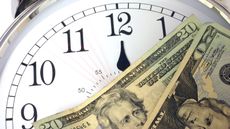How are Inherited EE or I Savings Bonds Taxed? Kiplinger Tax Letter
It all depends on what goes into the decedent’s final income tax return.


Getting the right tax advice and tips is vital in the complex tax world we live in. The Kiplinger Tax Letter helps you stay right on the money with the latest news and forecasts, with insight from our highly experienced team (Get a free issue of The Kiplinger Tax Letter or subscribe). You can only get the full array of advice by subscribing to the Tax Letter, but we will regularly feature snippets from it online, and here is one of those samples…
If you’ve inherited EE or I savings bonds that haven’t yet reached maturity, the federal tax rules can be complicated.
Most people who own EE or I bonds opt to defer reporting the interest as income for federal tax purposes until the earlier of the year the bonds mature or when they’re cashed in. So if you inherit EE or I bonds that haven’t yet matured, who is taxed on the predeath accrued interest?

Sign up for Kiplinger’s Free E-Newsletters
Profit and prosper with the best of expert advice on investing, taxes, retirement, personal finance and more - straight to your e-mail.
Profit and prosper with the best of expert advice - straight to your e-mail.
It depends on how that predeath interest is treated on the decedent’s final income tax return.
If the executor elects to include all predeath interest on that final return, then the beneficiary reports post-death interest on Form 1040 when the bonds mature or are cashed in, whichever comes first.
If the executor doesn’t include predeath interest on the decedent’s final return, then the beneficiary owes federal income tax on all pre- and post-death interest on the earlier of the bond’s maturity or redemption.
The Tax Court recently addressed this exact set of facts. In the case, a man who inherited a savings bond from his dad had it reissued in his name and later redeemed it. Treasury Direct sent him a Form 1099-INT reporting interest that accrued from the date his dad bought the bond.
But the son reported on his 1040 only the amount of interest that accrued from when the bond was reissued in his name until he cashed it in. That’s wrong. The dad never reported interest earned on the bond during his lifetime, and no election was made by his executor to include all the interest on the dad’s final Form 1040 when he died (Hitchman, TC Summ. Op. 2023-18).
This first appeared in The Kiplinger Tax Letter. It helps you navigate the complex world of tax by keeping you up-to-date on new and pending changes in tax laws, providing tips to lower your business taxes and personal taxes, and forecasting what the White House and Congress might do with taxes. Get a free issue of The Kiplinger Tax Letter or subscribe.
Read more

Joy is an experienced CPA and tax attorney with an L.L.M. in Taxation from New York University School of Law. After many years working for big law and accounting firms, Joy saw the light and now puts her education, legal experience and in-depth knowledge of federal tax law to use writing for Kiplinger. She writes and edits The Kiplinger Tax Letter and contributes federal tax and retirement stories to kiplinger.com and Kiplinger’s Retirement Report. Her articles have been picked up by the Washington Post and other media outlets. Joy has also appeared as a tax expert in newspapers, on television and on radio discussing federal tax developments.
-
 The Clock Is Ticking on Tax Cuts: Act Now to Avoid Missing Out
The Clock Is Ticking on Tax Cuts: Act Now to Avoid Missing OutEstate and gift tax exemptions are at an all-time high until the end of 2025. That may seem like a long way off, but setting things up could take longer than expected.
By Christopher F. Tate, J.D. Published
-
 Should an ESOP Be Your Only Retirement Account?
Should an ESOP Be Your Only Retirement Account?When it comes to saving for retirement, diversification is critical. Consider building your nest egg with a combination of accounts in addition to an ESOP.
By Peter Newman, CFA Published
-
 When's the Best Time to Buy a Domestic Flight? The Kiplinger Letter
When's the Best Time to Buy a Domestic Flight? The Kiplinger LetterThe Kiplinger Letter A new study by CheapAir.com has crunched the numbers.
By Sean Lengell Published
-
 Woes Continue for Banking Sector: The Kiplinger Letter
Woes Continue for Banking Sector: The Kiplinger LetterThe Kiplinger Letter Regional bank stocks were hammered recently after news of New York Community Bank’s big fourth-quarter loss.
By Rodrigo Sermeño Published
-
 How to Report QCDs on Your Tax Return: The Tax Letter
How to Report QCDs on Your Tax Return: The Tax LetterThe Tax Letter Qualified charitable distributions, otherwise known as QCDs, can be tricky when it comes to tax reporting. We've got some pointers to help with filing.
By Joy Taylor Published
-
 What to Know About Medical Expenses and Your Tax Deductions: The Tax Letter
What to Know About Medical Expenses and Your Tax Deductions: The Tax LetterThe Tax Letter What you need to know about deducting medical costs on your tax return.
By Joy Taylor Published
-
 The Net Investment Income Tax is Broader Than You Think: The Tax Letter
The Net Investment Income Tax is Broader Than You Think: The Tax LetterThe Tax Letter The 3.8% net investment income tax, which is added to the regular income tax, covers more than you might think.
By Joy Taylor Published
-
 What to Know Before Splitting 401(k) Assets in a Divorce: The Tax Letter
What to Know Before Splitting 401(k) Assets in a Divorce: The Tax LetterThe Tax Letter Splitting 401(k) assets in a divorce can lead to unintended tax consequences, there are ways to avoid financial penalties.
By Joy Taylor Published
-
 Anxious Flyers Take Note: The Kiplinger Letter
Anxious Flyers Take Note: The Kiplinger LetterThe Kiplinger Letter Whether it's the routes to avoid that have the most turbulence or the safest airline, we've got you covered.
By Sean Lengell Published
-
 The Auto Industry Outlook for 2024
The Auto Industry Outlook for 2024The Kiplinger Letter Here's what to expect in the auto industry this year. If you’re in the market for a car it won’t be quite as daunting as it was during the pandemic and after.
By David Payne Published









